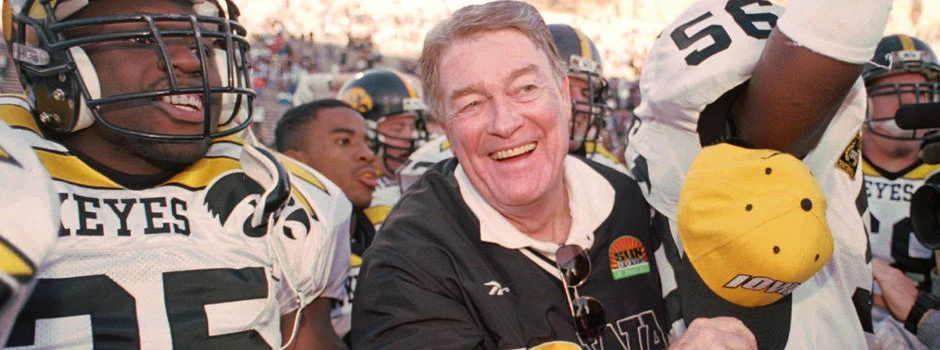My top four Iowa head football coaches of all time
By Pat Harty
IOWA CITY, Iowa – In trying to rank the greatest Iowa head football coaches of all time, trimming the list to four is easy, with the four being Howard Jones, Forest Evashevski, Hayden Fry and Kirk Ferentz in chronological order.
A case also could be made for Eddie Anderson, who coached Nile Kinnick and the legendary Ironmen to a 6-1-1 record in 1939.
But Iowa also finished with a losing record in four of Anderson’s eight seasons as head coach.
Alden Knipe also led Iowa to an 8-0-1 record in 1899, and to a 7-0-1 record in 1900, but he only coached for five seasons.
Iowa has had 25 head coaches in football dating back to E.A. Dalton in 1892.
But four head coaches clearly standout for their success, and in the case of Fry and Ferentz, for their success, and for their longevity. Fry and Ferentz are the only head football coaches to lead a Division I program for at least 20 years consecutively.
Ferentz is entering his 23rd season as head coach, and is Iowa’s all-time winningest football coach with a 168-106 record. He is also the longest tenured head football coach at the BCS level, and has coached at Iowa longer than anyone else in football.
Fry held the previous record for longevity, coaching the Hawkeyes for 20 seasons from 1979 to 1998, while Howard Jones coached for eight seasons from 1916 to 1923, and Evashevski coached for nine seasons from 1952 to 1960.
The hard part is ranking the top four in order of greatness because it’s so subjective, and because it’s hard to compare coaches from different eras.
But I did it anyway, and here are my top four beginning with number four on the list:
4. Howard Jones: He has the distinction of being the only Iowa coach to finish a season with a perfect record, and he did it twice as Iowa finished 7-0 in both 1921 and 1922.
Jones also coached some of the best players in program history, including Duke Slater, Aubrey Devine, Gordon Locke, Lester Belding and Fred Becker.
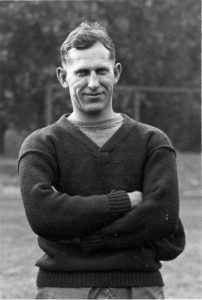
His 1921 squad outscored its seven opponents 185-36, while his 1922 team had three shutouts and allowed more than nine points in a game just once.
It was without question the most dominant two-year run in program history, but Jones resigned after the 1923 season to become the head coach at Trinity College, now known as Duke University, where he coached for just one season before taking over at the University of Southern California in 1925.
Jones’ wife reportedly disliked the bitterly cold Iowa winters and he demanded a new contract that would’ve allowed him to coach and live in Iowa City only during the football season. But his demands led to a conflict between Jones and the Chairman of the Board of Regents and Jones eventually resigned.
Jones built USC into a national power, winning seven Pacific Coast Conference championship during his 16-year reign from 1925 to 1940.
However, Jones died suddenly and unexpectedly of a heart attack on July 27, 1941 after becoming ill while washing and waxing his car at his home Toluca Lake, California. He was 55 years old.
3. Kirk Ferentz: Iowa’s current head coach has been a part of the program for over 30 years if you include the nine seasons Ferentz spent as Fry’s offensive line coach from 1981-89.
Ferentz replaced Fry shortly after the 1998 season, but the wins didn’t come easy at first as Iowa lost 18 of its first 20 games under Ferentz.
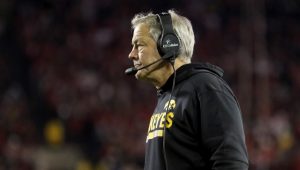
The 2001 season marked a breakthrough as Iowa won seven games, including a 19-16 victory over Texas Tech in the Alamo Bowl.
That set the stage for a three-year run from 2002-04 in which Iowa combined to finish 31-7 while winning two Big Ten titles and two January bowl games.
Iowa has made 17 bowl appearances since 2001, and it would’ve been 18 if the 2020 Music City Bowl hadn’t been canceled due to Covid-19 health concerns with Iowa’s opponent, Missouri.
The Hawkeyes also have a 53-21 record over the past six seasons, and finished last season with six consecutive victories after having started 0-2.
Combine those numbers with Ferentz’s success at developing future NFL players and there is so much to like about his job performance.
But I still couldn’t put Ferentz ahead of Fry or Evashevski because Ferentz also has gone 16 years without winning a Big Ten title, and only once has Iowa won its division in 2015.
2. Forest Evashevski: He has the distinction of being the only Iowa head coach to win a Rose Bowl, and he accomplished that twice in 1957 and 1959.
Iowa’s five-year stretch under Evashevski from 1956-60 is arguably the greatest five-year stretch in program history as the Hawkeyes won a share of the national title in 1958, two Big Ten titles, two Rose Bowls and had a 37-8-2 overall record.
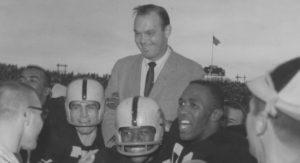
Alex Karras also won the Outland Trophy in 1957 as the best collegiate lineman in the country, while quarterback Randy Duncan finished runner-up for the Heisman Trophy in 1958.
The program was thriving when Evashevski retired after the 1960 season at the age of just 42.
Evashevski wanted to be both head coach and athletic director, but the Board of Regents denied that request, concerned that he would have too much power.
Evashevski was the Iowa Athletic Director throughout the 1960s, but it was a tumultuous time as the football program quickly fell from elite status under head coach Jerry Burns, who finished with a losing record in three of his five seasons, including 1-9 in 1965.
Evashevski also had a well-documented feud with head coach Ray Nagel, who was fired in 1970 after five seasons in which he failed to have a winning record in any season.
Evashevski’s biggest flaw is that he didn’t coach long enough at Iowa. He was two years younger when he retired than Ferentz was when he was hired as the Iowa head coach.
Evashevski’s body of work, as great as it is, just isn’t big enough for him to top this list.
He also coached during the time of one-platoon football, and when it was easier to get players in school from an academic standpoint. Many of Iowa’s opponents in the 1950s also didn’t recruit black players.
- Hayden Fry: Iowa had suffered through 19 consecutive non-winning seasons when former athletic director Bump Elliott hired Hayden Fry to end the misery.
Some were starting to believe that Iowa would never be competitive again in football.
Elliott already had failed with his first two head coaching hires as Frank Lauterbur and Bob Commings both were fired after the 1973 and 1978 seasons, respectively.
Lauterbur only lasted three seasons and was fired after Iowa finished 0-11 in 1973.
So Fry faced a daunting task when he was hired shortly after the 1978 season.
Morale and attendance were low, and Elliott’s job was on the line. If Fry had failed to deliver, Elliott almost certainly would have lost his job because an athletic director rarely gets to hire multiple head coaches in football who then fail to get the job done.
But to say that Fry delivered would be an understatement.
He led Iowa to the 1981 Big Ten title in his third season as head coach, and to the Rose Bowl for the first time since 1959.
Fry would go on to win three Big Ten titles at Iowa while compiling a 143-89-6 overall record.
He also is credited with breaking the stranglehold that Ohio State and Michigan had on Big Ten football, and with ending the three-yards-and-a-cloud-of-dust description of Big Ten football.
Ohio State and Michigan had played in every Rose Bowl since the 1968 season when Iowa had its breakthrough season in 1981.
Fry’s biggest blemish is that he was winless in three Rose Bowl appearances, but that isn’t enough to move him from the top spot.
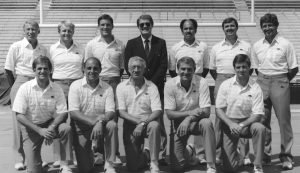
Fry, who passed away on Dec. 17, 2019 at the age of 90, also created the tiger hawk logo and helped to market and promote the Iowa football program like no other head coach had before him. He was a master motivator and innovator, and used his charisma and gift for gab to spread his message.
Fry also had a knack for hiring quality assistant coaches and his coaching tree, which includes Kirk Ferentz, Bill Snyder, Bob Stoops and Barry Alvarez, now ranks among the best in the history of college football.
It took somebody special to be ranked ahead of Forest Evashevski, and Hayden Fry certainly fits that description.
